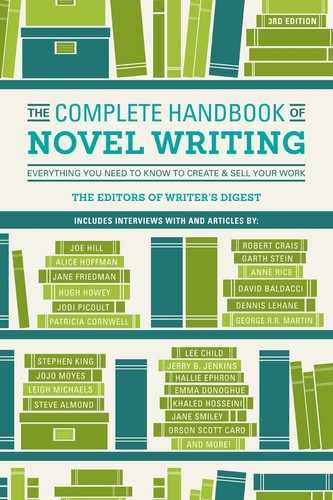Best-Selling Advice: Plot and Structure
“Plot is people. Human emotions and desires founded on the realities of life, working at cross purposes, getting hotter and fiercer as they strike against each other until finally there’s an explosion—that’s plot.”
—Leigh Brackett
“Remember: Plot is no more than footprints left in the snow after your characters have run by on their way to incredible destinations.”
—Ray Bradbury
“Plot, or evolution, is life responding to environment; and not only is this response always in terms of conflict, but the really great struggle, the epic struggle of creation, is the inner fight of the individual whereby the soul builds up character.”
—William Wallace Cook
“To me, everything in a novel comes down to people making choices. You must figure out in advance what those choices are going to be.”
—Marion Zimmer Bradley
“The problem for me is finding my own plots. They take a long time. … I like to have it happen, just like in our own lives. We don’t always know where they’re going, and if we make formal decisions on a given night, if we sit down and put a list of things we’re going to do on a piece of paper, they almost never work out right.”
—Norman Mailer
“I make a very tight outline of everything I write before I write it. … By writing an outline you really are writing in a way, because you’re creating the structure of what you’re going to do. Once I really know what I’m going to write, I don’t find the actual writing takes all that long.”
—Tom Wolfe
“For a book to really work, form and function must go hand in hand, just like with buildings, as any decent architect will tell you.”
—Tracy Chevalier
“Transitions are critically important. I want the reader to turn the page without thinking she’s turning the page. It must flow seamlessly.”
—Janet Evanovich
“Sometimes one can overanalyze, and I try not to do that. To a great degree, much of the structure has got to come naturally out of the writing. I think if you try to preordain, you’re going to stifle yourself. You’ve got a general idea, but the rest has to come naturally out of the writing, the narrative, the character, and the situation.”
—Robert Ludlum
“There is no finer form of fiction than the mystery. It has structure, a storyline, and a sense of place and pace. It is the one genre where the reader and the writer are pitted against each other. Readers don’t want to guess the ending, but they don’t want to be so baffled that it annoys them. … The research you do is crucial. In mystery fiction, you have to tell the truth. You can’t fool the reader and expect to get away with it.”
—Sue Grafton
“Too many writers think that all you need to do is write well—but that’s only part of what a good book is. Above all, a good book tells a good story. Focus on the story first. Ask yourself, ‘Will other people find this story so interesting that they will tell others about it?’ Remember: A best-selling book usually follows a simple rule, ‘It’s a wonderful story, wonderfully told’; not, ‘It’s a wonderfully told story.’”
—Nicholas Sparks
“We’re past the age of heroes and hero kings. If we can’t make up stories about ordinary people, who can we make them up about? … Most of our lives are basically mundane and dull, and it’s up to the writer to find ways to make them interesting.”
—John Updike
